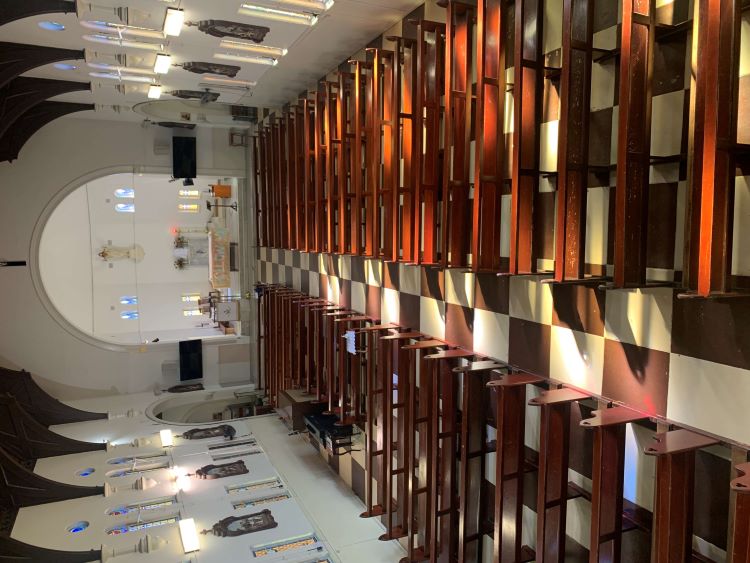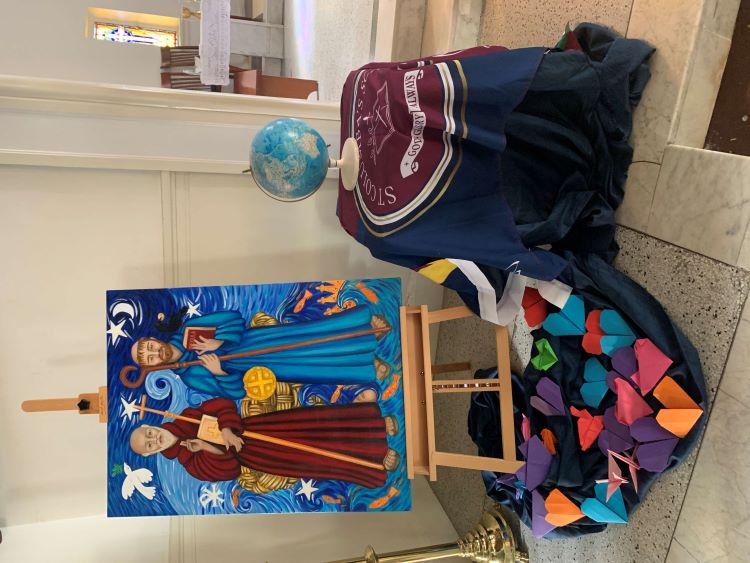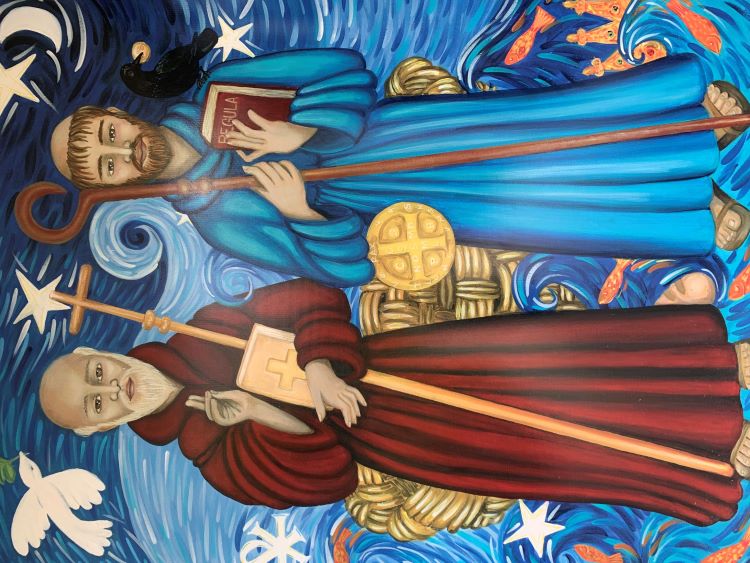Introduction
Greetings and God’s Blessing to you. Welcome to our Religious Education and Religious Life of the School page. My name is Michaela Lewis and I have the privilege and pleasure of being Assistant Principal- Religious Education at St Columba’s School. Please read on to find out about what we do in the areas of Faith and Religious Education. Together with families and the parish community, we strive to create a vibrant and faith-filled environment where the religious life of the school is celebrated through prayer, liturgy, social justice initiatives, and community outreach.
Please do not hesitate to contact the school office if you would like to speak with me or to find out further information.
Religious Education
At St Columba’s School, Religious Education is integral to the life of our community. It shapes our identity, inspires our values and guides our daily interactions. Firmly based in the Catholic tradition, our Religious Education program nurtures faith, deepens understanding and encourages students to live out the Gospel in meaningful ways.
Our curriculum follows the Brisbane Catholic Education Religious Education Guidelines, ensuring a consistent and comprehensive approach across all year levels. Teachers plan and deliver units using the approved curriculum, fostering both religious literacy and spiritual formation. Collaborative planning is a key feature of our approach. Teachers meet regularly with the Assistant Principal: Religious Education (APRE) and the Primary Learning Leader (PLL) to design short cycles of learning that are responsive, engaging and aligned with the needs of our students.
Religious Education at St Columba’s has two important parts: teaching about religion and nurturing faith.
The educational side happens in the classroom. Guided by the Brisbane Catholic Education Religious Education Curriculum, students learn about scripture, other religions and the role of faith in life and society. Teachers use the curriculum to plan lessons that help students grow in knowledge, skills and values based in the Catholic Tradition. Like other subjects, students are assessed, and their progress is shared with parents.
The faith formation side is lived out in the daily Religious Life of our school. Each class begins and ends the day with prayer. Staff pray communally each week and before all meetings. We regularly celebrate Mass and prayer services, and every fortnight a class leads a prayer liturgy at assembly. We also gather to practise liturgical songs and celebrate special events like St Columba’s Day near June 9. Families are always welcome to join us in our celebrations. Each week a class is rostered on to attend the Parish Mass each Thursday at 9am.

St Columba’s Church
Benedictine Values
As the school was founded by the Sisters of the Good Samaritan, the Benedictine Values guide our work and our interactions with others. The twelve Benedictine Values have been divided into a three-year cycle, to ensure that they are covered in a meaningful way. Each term starts with a lesson on the focus value. The Benedictine awards for the term are given out each fortnight on assembly to students who have exemplified this focus value. The Benedictine Value Cycle can be found here.
Special Celebrations
Family Mass
A highlight of each term is the celebration of a Family Mass with the parish community. Held around Week 4 of each term, the school choir leads the singing, and children proclaim the Liturgy of the Word. At the Offertory procession, children from St Columba’s and other local schools bring up the gifts.
St Columba’s Feast Day
We celebrate the Feast of St Columba on the Friday closest to 9 June, the actual feast day. Starting with a beautiful Mass in the Church, the students then return to their classrooms to learn about St Columba’s life and good works. The students are then divided into vertical age-groupings to enjoy working on a St Columba’s Day activity designed by each class teacher.

Setting a sacred space in the Church
The Journey of St. Columba
St. Columba was a faithful man from Ireland who lived in the sixth century. He travelled to Scotland with a group of companions, settling on the island of Iona. There, he built a monastery that became a centre for learning and worship. Through teaching and storytelling, St. Columba helped spread the Christian faith across Scotland. His legacy of hope, faith, and service continues to inspire people today.

This beautiful image of St Columba’s and St Benedict welcomes visitors to the school office area
Social Justice
St Columba’s School promotes a strong sense of Social Justice and encourages its community to support several Catholic charities, as well as taking a responsive approach to the needs and projects related to families. The school supports the annual appeals of Caritas, Catholic Mission and St Vincent de Paul. The Year 6 Social Justice Committee raises money through special events for these initiatives.
Parish Sacramental Program
Another part of the Faith Formation dimension is the Sacramental life of children. Parents are the first and most important educators of their children (Declaration on Christian Education, 1968, Vatican II) and it is within the faith development of family and home that children come to a deeper realisation and practice of their faith. The school, as an agency within the Parish, acts as a conduit to allow children to experience the Sacramental life of the Church.
The Kedron Brook Catholic Community (St Columba's, Wilston and St Jonh the Baptist, Enoggera) follows the Sacramental Policy of the Archdiocese of Brisbane. The sacramental journey, which we encourage children to continue, follows the following program:
In the year when the children turn eight — Year 3, they are sealed with the gift of the Holy Spirit in the Sacrament of Confirmation, celebrated in the 2nd Term.
In the year when the children turn nine — Year 4, they are welcomed to the Lord's Table and receive First Holy Communion (Sacrament of Eucharist), celebrated in the 3rd Term.
In the year when the children turn ten — Year 5, they prepare for the Sacrament of Penance with individual confession and absolution (the first rite), celebrated in the 1st Term.
Parents of a child in the years where one or other of these sacraments may be received will be asked to formally enrol their child to receive that sacrament in that year. This recognises the fact that parents are the first and foremost educators of their children in regard to faith formation and so would be in the best position to decide on the readiness of their children for the sacraments.
The preparation for the Sacraments of Confirmation, First Eucharist and Reconciliation will involve the parents, guided by the Parish Sacramental Team. Parents who wish their children to receive (celebrate) the sacraments will be required to attend information sessions where there may be instruction from the priest/sacramental team on some aspect of the sacrament, an explanation to parents about how to use the support material provided in their child's period of preparation and details about the celebrations. Active participation by parents is seen as essential to the effectiveness of each child’s preparation.
In school, teaching of the sacraments in the Religious Education Curriculum is part of every year's study, allowing children to develop a deeper understanding of the sacraments and their place in their lives.
For further information about the Sacramental Program please contact the Kedron Brook Catholic Community:
A sacred space for the season of Lent